- What is metaverse real estate?
- Prices in the real estate metaverse
- Opportunities in the metaverse for real estate
- Metaverse real estate management
- Metaverse real estate property development
- NFT real estate metaverse
- How to build real estate in the metaverse?
- Step 1: Choose a platform
- Step 2: Make a metaverse smart contract
- Step 3: Design the metaspace as per your choice
- Step 4: Build a layer for interaction
- Step 5: Build an interoperability layer
- Avenues for virtual real estate metaverse investors
- Digital Stores
- Gaming
- Entertainment
- How can Appinventiv help in the Metaverse real estate property development?
- FAQs
The metaverse is still a young concept. Investments in it carry significant risks. However, given the equally high likelihood of major profits, it might be worth the risks. However, you must conduct your due research before deciding to accept risks, just like with any other investments and business endeavors. But now, there is a new twist to it.
The real estate industry has experienced some major technology upheavals during the past few years. Virtual land sales have started gaining substantial traction, because of which technological breakthroughs are completely transforming the real estate industry. The metaverse is now extremely popular worldwide, thanks to the increased adoption of technology.
New virtual worlds are being created at a dizzying pace, and the testing of business models in these brave new virtual worlds has put everyone, from large businesses to creative startups, in the media spotlight. The fact that individuals are purchasing, constructing on, and using virtual land in creative ways is also generating new prospects for the conventional real estate sector in the metaverse.
You are probably left confused with a few questions about metaverse real estate if this is a new concept to you. If you are also curious about the metaverse real estate business, keep reading to learn more.
What is metaverse real estate?
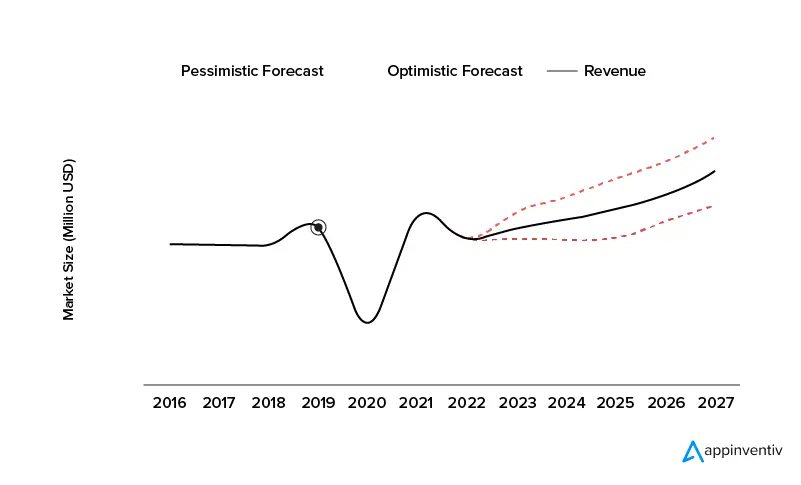
Real estate in the metaverse refers to plots of land or residential and commercial structures that exist in a virtual environment. You can build any kind of property on that site, including billboards for advertising, business districts, and the corporate headquarters of actual companies.
The metaverse real estate is actually just pixels on your computer screen. However, many platforms have been built to be programmable environments where users can interact socially, trade non-fungible tokens (NFTs), play games, promote their goods and services, and even attend meetings using 3D avatars.
Digital real estate is anticipated to increase in value with the growth of the metaverse. In reality, once Facebook changed its name to META and signaled a targeted interest in the metaverse, there has been a boom in metaverse real estate in the last quarter of 2021. The price of metaverse real estate is anticipated to increase by 45.2% CAGR from 2020 to 2025 as its popularity rises.
Prices in the real estate metaverse
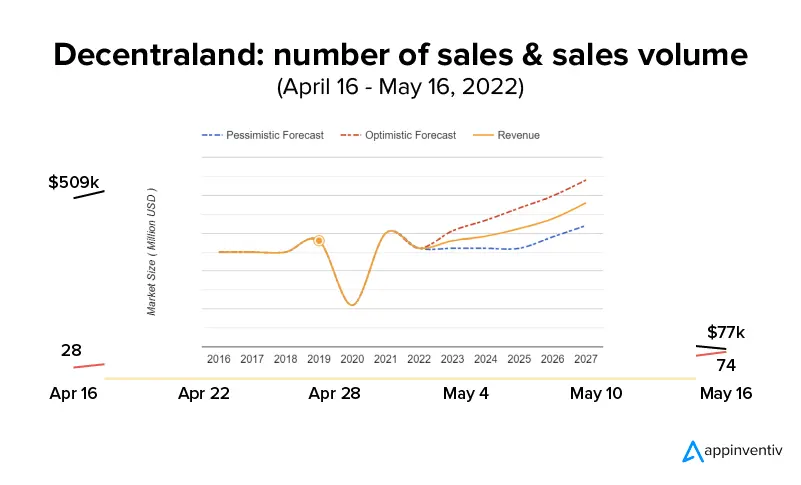
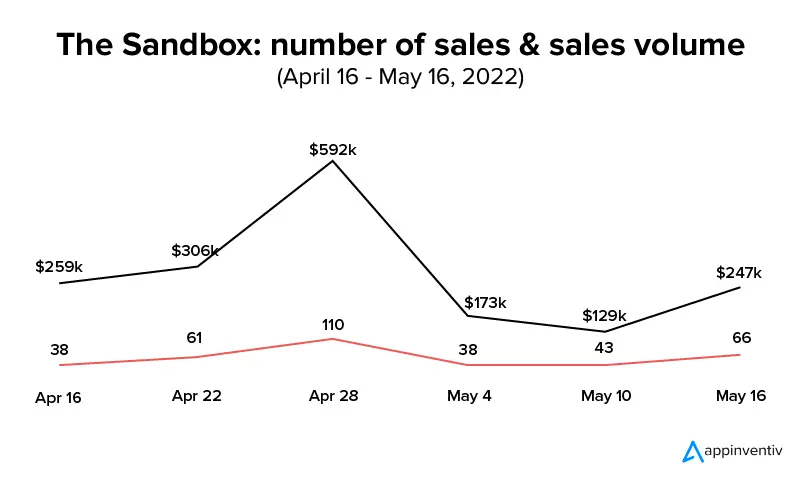
The price of real estate in the metaverse is soaring. Consider the case of Decentraland. In December 2017, the platform launched its inaugural auction, selling land pieces for $20 each. The price of this product rocketed to $6,000 by 2021, and it continued to rise until it reached $15,000 at the beginning of 2022. In 2021, the Sandbox, a different metaverse platform, had a 15,000% increase in virtual land.
Depending on its size, platform, and location, virtual land parcel prices might vary greatly. At present, a modest property on Decentraland would cost you $2.4 million, whereas one in Somnium Space would cost you up to $6,362.
Don’t overlook all the related costs as you are ready to invest in metaverse real estate. You will probably pay processing costs in addition to the parcel price, which can be up to 5% of the land cost and gas fees for Ethereum-based enterprises. Additionally, some metaverse marketplaces demand that you deal using their own cryptocurrency. If you don’t have those, be ready to exchange your money for another while taking all the associated losses.
The metaverse for real estate is already gaining much interest from businesses. It has been able to gain sales of $501 million, as recorded in 2021, and is expected to double to $1 billion by 2022.
Opportunities in the metaverse for real estate
In the Metaverse, properties can be constructed, purchased, and sold with ease, just like traditional real estate. Virtual land or space owners can easily rent it out to other people.
When compared to traditional real estate, transactions on the Metaverse are far less complicated because users may identify suitable properties, handle the paperwork, and communicate with brokers and agents from the comfort of their homes. Users can also purchase metaverse land and afterward rent it out.
The Metaverse real estate is significantly more adaptable, thanks to these qualities. Users can easily purchase a plot of land and turn it into any type of building, such as a school, store, gallery, or event space. The opportunity to develop ROIs for real estate enterprises in this market is enormous.
Metaverse real estate management
An intriguing prospect for digital real estate metaverse firms is property management. The virtual world has its potential, just as real estate in the real world. Whatever the sort of company or asset, there is a vast potential for metaverse real estate growth. In addition to enabling users to purchase land in the metaverse, important services include:
- Property management for customers
- Visual and technological property management
- Rental assortment
- Contact person for any client-related problems and questions
Metaverse real estate property development
In the metaverse, you can provide full-stack property development services. You can build a successful business model by working with a metaverse real estate development firm. Your real estate development can be aided by the blockchain corporation, and you can use the time you save for other important tasks like:
- Designing your construction
- Creating a building plan
- Improving your plan and designs
- Creating a map of development
NFT real estate metaverse
The NFT real estate metaverse is a quickly expanding market that draws both businesses and consumers. Real estate assets can be turned into non-fungible tokens or NFTs to enable owners to generate passive income.
Businesses can offer to tokenize a space, a plot of land, a structure, or a whole city into one or more NFTs. These days, NFTs represent many assets in the shape of objects, avatars, talents, and other assets.
[Also Read: Metaverse use cases and benefits]
How to build real estate in the metaverse?
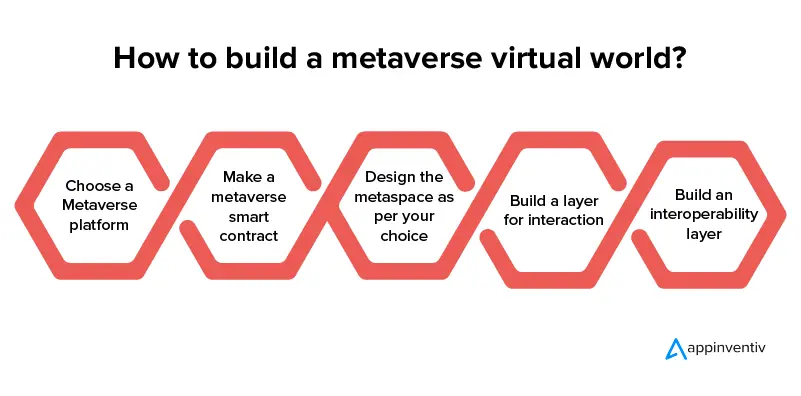
The component level of metaverse real estate development consists of steps like building the infrastructure, producing content, and finally defining the operating logic through protocols.
But this merely prepares the property’s framework. For users in the metaverse, the digital infrastructure should offer a variety of services. The next step will be to add content to the properties, such as design, layouts, assets, and the range of activities.
Defining the operating standards and protocols comes last. These would specify the governing laws and regulations, as well as commercial logic like buy-sell agreements, rental contracts, etc.
Step 1: Choose a platform
Creating real estate in the metaverse calls for a wide range of abilities. Before anything else, you must choose which platform you want to use for creating your real estate metaverse. The foundation to build a democratic and community-driven virtual world is currently provided by all major blockchain platforms, including Ethereum, Polygon, Algorand, Solana, and others.
This implies that a blockchain-based metaverse is supported by the capability of a smart contract, which requires certain actions to be taken in response to certain circumstances. We require decentralized finance for maximum functionality, which is why it’s crucial to enable cryptocurrencies and NFTs.
You can select those platforms to establish real estate properties inside existing blockchain metaverse platforms like Decentraland, Sandbox, etc. Building a metaverse ecosystem from scratch and adding real estate properties is the key to creating a larger and more specialized platform.
It is recommended to create a metaverse real estate software from scratch and incorporate the capabilities and features of your choice because the existing metaverse platforms are still in their infancy.
A skilled metaverse real estate development company like ours can always help you here by streamlining the procedure.
Step 2: Make a metaverse smart contract
A metaverse smart contract is a set of unchangeable “rules” that cause specific actions to be taken when particular conditions are satisfied. One feature of the smart contract is the ability to start a transaction between a buyer and a seller after both parties click “Agree.”
Smart contracts can also be used to specify and carry out leasing agreements between two parties. This includes terminating the agreement if the renter disobeys specific rules or conduct guidelines.
Smart contracts are the foundation for fully utilizing the advantages of a virtual real estate metaverse ecosystem. You can tokenize real estate assets into non-fungible entities by using an NFT smart contract.
You will need to work on smart contracting based on blockchain technology. You would specifically require the knowledge of a metaverse blockchain development company at this point. Since both physical and digital real estate depends on financing for growth, blockchain is a crucial part of any enterprise.
Step 3: Design the metaspace as per your choice
The next logical step is to construct the metaspace after selecting the metaverse digital real estate platform.
An app, a virtual conference room, a virtual meeting room, or even a virtual home theatre can all be considered metaspaces. A user with a VR headset can enter Metaspace, a virtual environment. The ideation of the metaverse real estate property comes once the platform has been completed. It entails designing the building’s architecture.
The size of a metaspace can be as little as a room or as large as a metropolis in its entirety. Similar architectural design skills are needed for real estate properties in the actual world. You may easily carry out 3D designing and virtual reality application development in line with the goal of a blockchain-enabled platform with the support of a metaverse development business.
Step 4: Build a layer for interaction
The interaction layer construction comes next. You are now developing the application logic to allow assets and characters to engage with the digital real estate of the metaverse.
Accessibility, navigation, communication protocols, and user controls are all governed by this layer. An easy illustration is when a user uses an entry pass to enter the main gate of a real estate establishment, like an event hall. It is necessary to specify the integration with external apps at this layer. For instance, devices like Zoom, smart glasses, virtual reality goggles, headsets, haptic gloves, sensors, etc., are needed for video calling.
Everything develops the connection between the physical world and the enabled metaverse at this layer.
Step 5: Build an interoperability layer
The metaverse’s reach is increased by interoperability, which also increases involvement. For instance, a user of one metaverse might desire to purchase tickets to and attend an event taking place inside a piece of real estate in the other.
Interoperability across several underlying blockchain technologies is crucial to achieving the same.
It’s crucial to promote cross-environment transactions if you want to create a fully functional virtual world. Therefore, pick a blockchain that facilitates quick and safe payment gateway transactions.
Avenues for virtual real estate metaverse investors
Digital plots of land and metaverse real estate have a lot of promise for NFT trade. This is how metaverse helps by giving users a unique and lucrative method to engage in virtual reality. In the Metaverse, people can now buy a piece of property and generate regular rental income from it, removing the geographic restriction that once prevented the sale of real estate.
By tokenizing lands into NFTs, the metaverse has radically changed real estate and properties. Following are some of the basic options available to real estate investors in Metaverse:
Digital Stores
By integrating metaverse into their systems, brands and companies are able to open their stores in the metaspace where customers can explore and purchase their commodities. All they have to do is click on the commodity and make the payment using the method chosen before registering in the metaverse.
Gaming
The metaspace provides unlimited gaming options with innovative technology. It is like an entire gaming universe where you can construct buildings and other commodities and gain profits. This type of gaming can be transferred to the P2E or play-to-earn real money model.
Entertainment
We are headed towards a time where people will go out to watch cinema and theatre in the metaverse. So, there are immense possibilities for the entertainment industry to bring audiences together. There will be theme parks, concerts, and halls, gathering talent of all kinds.
How can Appinventiv help in the Metaverse real estate property development?
Appinventiv has an expert team of software developers who have gained global experience in providing digital solutions for enterprises across different domains. With the use of the latest technologies, Appinventiv offers thoroughly innovative metaverse development services keeping the practicality of the application intact.
Appinventiv can provide you with its metaverse development services to create a real estate business in metaverse that is built as per your preferences and choices. The metaverse real estate app development will be focused on customizing solutions for your specific needs, and the outcome is guaranteed to bring profits.
We shall work with you as a team to provide you with the best possible metaverse real estate app that you can immediately start transacting in. So, get in touch today!
FAQs
Q. Are there any risks involved in the metaverse for virtual real estate?
A. Just like the risks involved in real estate in physical life, there are also potential risks in virtual real estate. Though gaining popularity with speed, metaverse real estate is still in its infancy and yet has a long way to go to become stable. Imagine what happens if a platform you invested in went offline permanently. Your investments and properties become non-existent. The question of valuation is another problem. How to evaluate a piece of land with artificial scarcity and an unknowable future worth is a persistent difficulty. Metaverse land is vulnerable to fluctuating situations since its value depends on extremely volatile cryptocurrency.
Q. How to buy a virtual real estate property?
A. Buying a metaverse property functions very similarly to buying an NFT. Your ownership deed is a special bit of code on a blockchain. This code confirms your ownership of or rights to that digital land.
You will need your own digital crypto wallet compatible with the platform in order to begin building your portfolio of metaverse properties. After that, you can go to an online metaverse portal and register for an account. To purchase land and other assets, you must link your digital wallet to the site. Explore the land available and buy whichever one you like. You can also purchase metaverse land through brokers and property managers, just like you do with real-world properties.
Q. How is a land in the metaverse useful?
A. Metaverse landowners can build a variety of structures and interactive games on their virtual property. Once a Metaverse player has taken control of a piece of land, they have the power to create any kind of gaming environment and make it accessible to other players. The landowner, for instance, has the option of charging participants or creating a free game.
Additionally, the landowner can develop a museum to house all of their NFTs or build billboards to advertise on. Since players and users will want to visit all the many locations within the Metaverse, they must all design these experiences taking location into consideration. Owners of lands in the metaverse can rent out their properties to other people so they can create games, conduct events, and engage in social activities. These advantages and possibilities are as good as those in the actual world.



Building Virtual Worlds: How Digital Twins Power the Enterprise Metaverse
The metaverse is changing the online world. Just like Web 3.0, it's a game changer for businesses. Central to this change is Digital Twins, a leading-edge technology that makes the virtual worlds of the metaverse possible. The metaverse will likely be the next considerable economic power when the internet blends with real life. Estimates show…
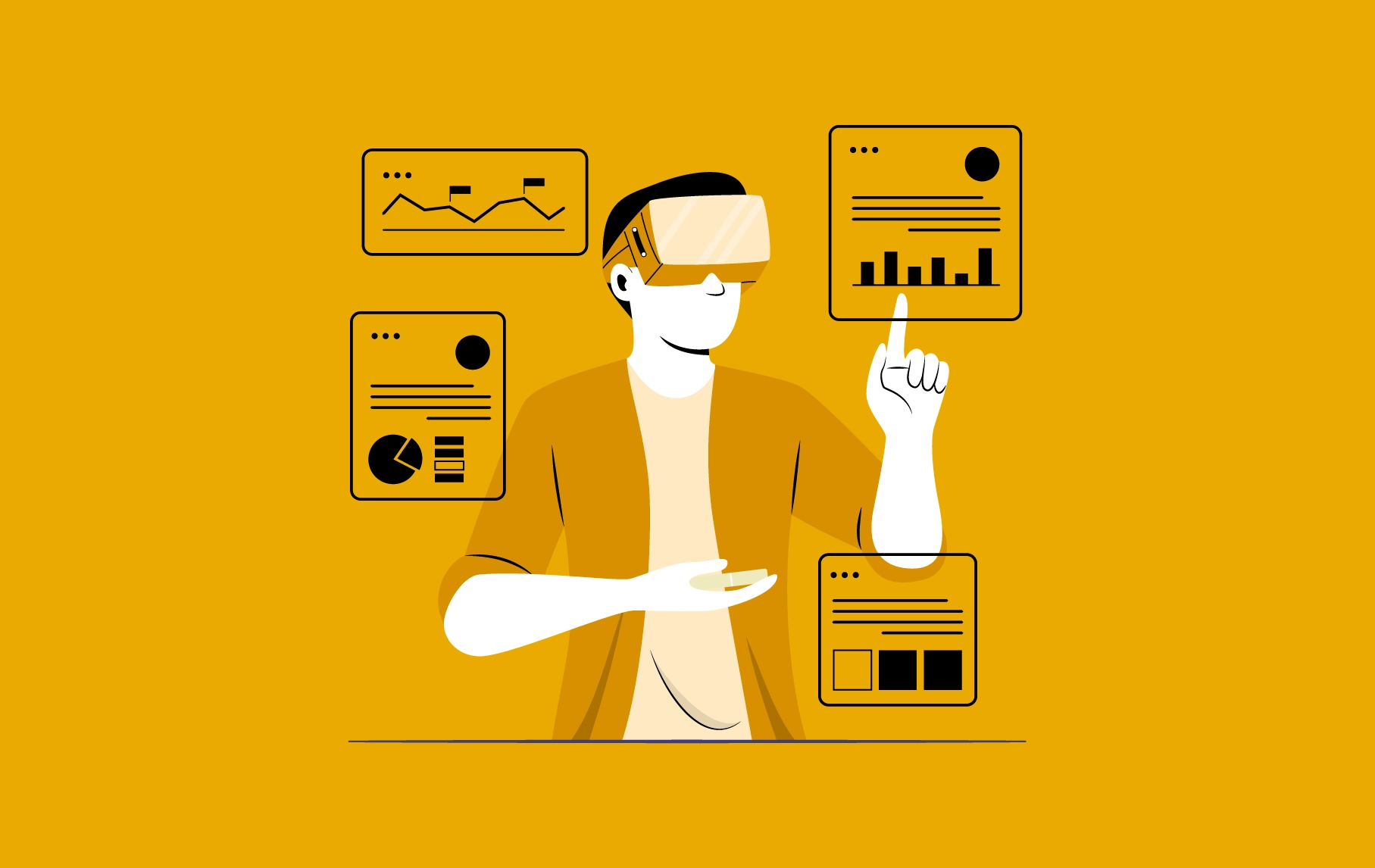
Metaverse in Training: Top 7 Use Cases and Benefits
The concept of the metaverse in training is revolutionizing how we approach learning and skill development. Experts predict a growth in the metaverse education market to an impressive $24.7 billion by 2030, showcasing a 43.76% CAGR during the 2023-2030 forecast period. This surge in interest is not surprising, given the unique benefits and applications of…

How is Metaverse Presenting New Opportunities for Insurance Businesses?
Metaverse has brought in a new wave of digital transformation by presenting the insurers with a robust technology toolset that helps them to get engage with the customers and develop new business strategies. As the line between the digital and physical world continues to blur, insurers are now prepared to enter into the ‘phygital’ environment…










